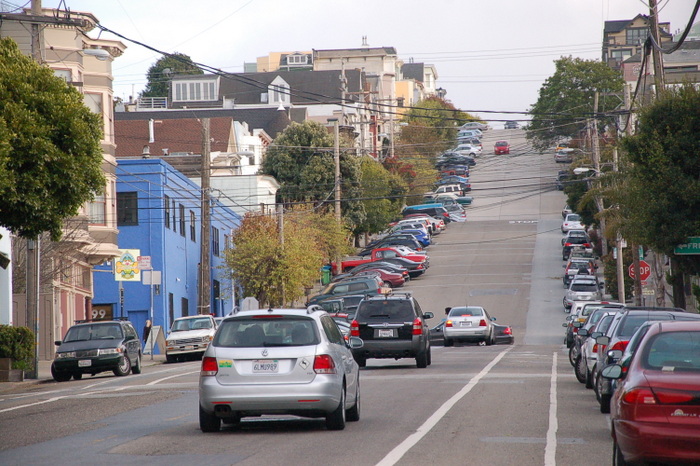The SFMTA has given up on its neighborhood-scale plans to install parking meters in the Dogpatch and Portrero Hill, while parking meter approvals in the northeast Mission move forward at a snail's pace. After two years of tangling with the city, the defenders of dysfunctional free parking have effectively caused a huge setback for progressive transportation policy -- meaning more traffic and slower transit in the future. Hooray for San Francisco.

SFMTA spokesperson Paul Rose told the Potrero View this month, "Any parking changes in the [Portero and Dogpatch] area are likely to be 'small in scope and iterative, with the goal of addressing parking on the busiest of commercial blocks, where customers are currently having a challenging time finding parking spaces. A comprehensive approach is not likely.'"
Rose told Streetsblog that down the road, the SFMTA will try to incorporate comprehensive parking management into longer-term area plans such as its Waterfront Transportation Assessment, a guide for development and transportation planning in areas near Dogpatch and Potrero Hill. "We are taking a step back to better work with the residents and merchants in the area to implement necessary changes," he said. "While every block will not be considered at once, we do want to implement more efficient strategies that address parking on the busiest of the commercial blocks where customers are currently having a challenging time finding spaces. We received significant feedback requesting that any parking discussions occur in the context of other major transportation and development projects in or near the area."
As for the parking-crunched northeast Mission, the first of the three neighborhoods where the SFMTA initiated its drawn-out parking outreach, only a small fraction of the planned meters are moving through the approval process -- nearly half a year behind the schedule presented at a public meeting in March [PDF]. The initial meters were delayed even further by meter opponents who protested the wrong hearing ordinance.
The baby-steps approach "should help create pockets of availability in some otherwise parked-out areas of the neighborhood, making it easier for visitors, customers, employees, and residents to find spaces," the SFMTA said in its latest email update on the plan. "Although this approach is a significant reduction in scope from previous parking proposals, it will still help open up some key spaces around the neighborhood. The changes outlined in this approach will give the SFMTA and neighbors the opportunity to see how a few blocks of parking meters and extended [residential parking permit] work and evaluate their effectiveness over time."
Tom Radulovich, executive director of Livable City, said the SFMTA shouldn't have abandoned the neighborhood-scale planning approach in Dogpatch and Potrero Hill, as it "makes a lot of sense."
"It's better to implement parking changes -- parking meters, or residential permit parking -- on the blocks where there is consensus than to do nothing at all," he said. "However, while an incremental approach may address problems on particular blocks, it may increase parking pressure on the unmanaged blocks nearby."
In an op-ed in the Bay Guardian this week, Jason Henderson, author of Street Fight: The Politics of Mobility in San Francisco, lamented city leaders joining "the bandwagon of pandering to motorists," with a recent Board of Supervisors vote "to block the expansion of parking meters, a proven source of revenue that could help avert future fare hikes or service cuts."
"It is also a key to managing the public right-of-way as Muni seeks to implement important improvements," Henderson wrote. "What seems to be happening now is that the supervisors are taking transit riders for granted while pandering to a conservative ideology of unfettered free parking."
By no means, however, does the anti-meter crowd appear to be pleased with the way SFMTA is scaling back its plans. Free parking activists like Eastern Neighborhoods United Front leader Mari Eliza are still attacking the SFMTA in Potrero Hill. Residents like Eliza want a permit system so they can park for free, and employers want a permit system so their employees can park for free.
This is par for the course. ENUF and its ilk have made it clear that they won't be satisfied until the SFMTA guarantees they won't have to pay to park on the street, basically asserting free parking as a fundamental right. The SFMTA's first move to quell anti-meter sentiment in these neighborhoods was to remove the SFPark brand from the plans, since opponents were attacking the program as a federally-funded imposition. This appears to have only emboldened the opponents of parking reform, however.
Meanwhile, former Potrero Boosters president and supervisor hopeful Tony Kelly continues to promote the idea of exempting car-owning residents from meter payment -- an absurd concept that would negate the purpose of metering spaces to ensure turnover. Residents also continue to call for the expansion of the RPP program to limit the number of commuters parking on streets, but it's up to residents themselves to initiate RPP petitions.
"Conservative ideology holds that the government accommodates unfettered, cheap automobility at all costs," Henderson wrote. "The impacts on Muni, on pedestrians, on bicyclists, and on the planetary environment are secondary to free parking. But progressives are becoming increasingly disoriented on this issue. While they decry parking meters, they haven't offered a way to better manage streets so that we can improve Muni, bicycling, and walking."




